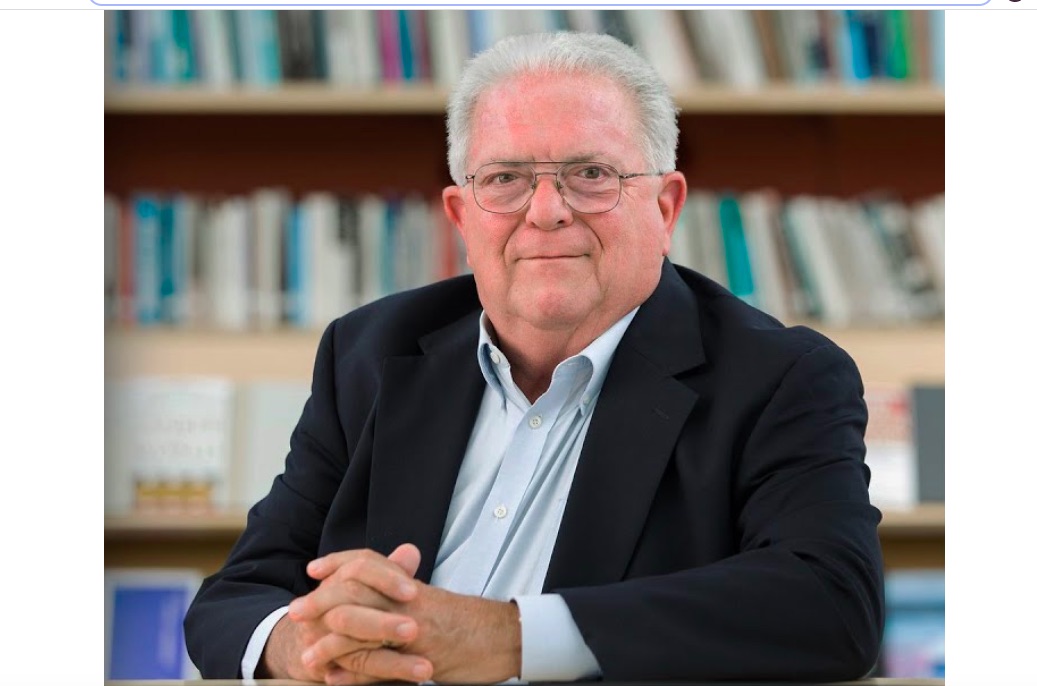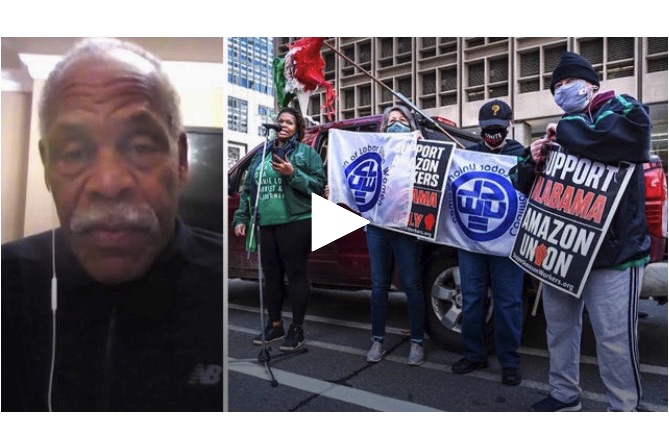FREE FLOW OF INFORMATION
An article by Jeremy Kuzmarov from CovertAction Magazine
On April 4, 2018—a date symbolically chosen because it is the 50th anniversary of Martin Luther King Jr.’s assassination—Clare Grady and six other activists broke into the Kings Bay Submarine base in St. Mary’s, Georgia, the largest nuclear submarine base in the world.
They carried hammers and baby bottles filled with their own blood. Their purpose? To symbolically “beat swords into plowshares,” as prophesied in Isaiah 2:4, by disarming one of the world’s deadliest swords—the Trident nuclear submarine.

Plowshares 7 congregate outside courthouse during their trial for breaking into the Kings Bay Submarine Base in Georgia. Martha Hennessy, Kathleen Rumpf (co-defendent in another Plowshares case), Mark Colville, Clare Grady, Carmen Trotta, Patrick O’Neill, Liz McAlister. (July 12th, 2019) [Source: beyondnuclearinternational.org]
It was no walk in the park
First, using a bolt cutter, this unlikely commando team of 60-, 70- and 80-year-old priests, grandmothers and grandfathers squeezed themselves through a remote gate on the base. Then they trekked, slopped, and splashed through two miles of notoriously inhospitable Southern Georgia swampland, swarming with ticks, fire ants, earwigs and mosquitoes—not to mention poisonous rattlesnakes—as well as venomous scorpions only an inch in length but whose sting can be fatal, and alligators, of which Georgia boasts a population of more than 200,000.
Finally, as reported by World Socialist Website, they reached a location “where they prayed, read from Scripture, splashed bottles of their own blood onto a wall, spray-painted messages against nuclear weapons onto a sidewalk, hammered on parts of a shrine to nuclear missiles and hung protest banners.”
As agreed in advance, all seven participants—Clare Grady, Father Stephen Kelly, Mark Colville, Martha Hennessy, Elizabeth McAlister, Patrick O’Neill, and Carmen Trotta—remained at the site, peacefully awaiting the police, so they could explain the reason for their actions. They were arrested, tried, and then convicted on October 24, 2019, in the U.S. District Court of the Southern District of Georgia for the crime of conspiracy, destruction of property on a naval installation, depredation of government property, and trespass.
Clare Grady was sentenced to a one-year prison term in Alderson Federal Prison in West Virginia, which began on February 10th, 2021.
As for the other six activists: Carmen Trotta was sentenced to 14 months; Patrick O’Neill to 14 months followed by two years of supervised probation. (He has appealed the sentence.); Steve Kelly to 33-months less time served and three years of supervised probation; Martha Hennessy to 10 months; and Elizabeth McAlister to time served, which was the 17 months she had spent in prison awaiting trial. (She was also sentenced to three years of probation.). Mark Colville will be sentenced in April.
“Festival of Hope” in Celebration of Clare Grady and the Plowshares 7
Going to prison has not discouraged Clare Grady, nor will it deter her from continued opposition to the makers of war and mass death who control our national government. To celebrate Clare Grady’s resilience and determination, and that of her six companions, the antiwar group Code Pink hosted a “Festival of Hope” webinar in honor of Clare and the Kings Bay Plowshares 7 on February 7, 2021, three days before the start of Clare’s prison term.
Try watching this video on www.youtube.com
Many who spoke at this virtual convocation are long-time activists who have spent their lives in the service of world peace and universal community. They include:
* Agnes Williams, a Seneca leader working in western New York;
* Leona Morgan, a Diné leader from the Navajo Nation, working in New Mexico and Arizona to stop uranium production and dumping on their lands;
* Clare Daly, Irish Parliamentarian and a co-defendant in an Irish trial of civil resistance to U.S. warplanes refueling at Shannon Airport;
* Setsuko Thurlow, a Hiroshima survivor who has worked tirelessly to end nuclear weapons and has been instrumental in the enactment of the Treaty for the Prohibition of Nuclear Weapons that went into force last week;
* Professor Russell Rickford, Cornell University historian of the Black Freedom Struggle and the Black Radical Tradition and an organizer with the Democratic Socialists of America;
* Emma O’Grady, writer, and actor from County Galway, Ireland;
* Rev. Bill Wylie-Kellermann, Detroit theologian, author, nonviolent community activist and civil resister to water shut-offs, who offered a closing prayer.
Setsuko Thurlow, a Hiroshima bomb survivor voiced her support for Grady and the Plowshares 7 in a pre-recorded statement that was played at the “Festival of Hope.”
In the statement, Setsuko described in vivid detail her experience in Hiroshima on the fateful day of August 6, 1945, when the atomic bomb was dropped.
At the time, Setsuko was on an excursion away from her school. Suddenly, she said, she was “blown into the air” and felt herself “floating” before she woke up to find herself in darkness under a collapsed building.
After hearing a male voice telling her “not to give up,” a soldier helped free Setsuko from the building, which was now on fire.
Outside, the air was filled with particles, and people moved on the streets as if they were ghosts, with their hair standing up to the sky, and their skin and flesh burned.
Some of the people had their intestines bulging out while others had their own eyeballs in their hands.
Setsuko escaped to a hill which was packed with dead bodies and people were begging for water.
Among the thousands of innocent people killed on that day were nine members of Setsuko’s family, including her aunt, uncle, sister and four-year-old nephew, whose small body became unrecognizable.
Setsuko stated that “this is what nuclear war does; it results in indescribable mass killing and suffering. Today, the weapons are even more destructive than in 1945, and could kill a million people in a quick moment.”
Standing up for Humanity
Setsuko’s warning was heeded by other speakers at the webinar who further emphasized the health hazards of nuclear energy and its contamination of the environment.
Clare Daly, a member of the European parliament who was jailed for protesting against U.S. military planes flying out of Shannon Airport in Ireland, stated that the “stance taken by Clare [Grady] was absolutely moral and courageous, she is a beacon to activists around the world. Clare joins people like Julian Assange in going to jail for standing up for humanity.”
Grady’s daughter, Leah, read a letter from Plowshares 7 activist Martha Hennessy, currently serving out her ten-month sentence at the Danbury Correctional Institution in Connecticut, who recalled how she and Clare had been imprisoned together for protest acts in the early 1980s and that Clare had taught her how to be a role model to other incarcerated women.
Patrick O’Neill, who is serving a 14-month sentence, sent a message from the Elkton Correctional Institution in Ohio that Clare will be a “light in the darkness” for women in her next stop, “a den of oppression and despair.”
At the trial, Plowshares 7 attorneys had tried to argue that the Religious Freedom Restoration Act of 1993 protected the protest because the seven were motivated by their faith and that nuclear weapons are illegal, as an indictment Hennessy taped to the door of the base alleged.
When Hennessy attempted to show the jury photos of bodies at Hiroshima, the judge objected.
At their sentencing, Plowshares activists invoked the Nuremberg principle, stating that it was their duty to try to stop another nuclear holocaust, and that those who “say nothing in the face of evil, are contributing to evil by their collective silence.”
Steve Kelley, who is a Jesuit priest said that he considered himself a “prisoner of conscience for Christ,” preaching against “the sin that flourishes in weapons of mass destruction.”
Grady stated at her sentencing that the weapons she had tried to sabotage were “not private property, they belong to the people of the United States, they belong to me, to you, to us.”
(continued in right column)
Question for this article:
How can we be sure to get news about peace demonstrations?
How can just one or a few persons contribute to peace and justice?
(continued from left column)
These weapons kill and cause harm in our name, and with our money. This omnicidal weapon doesn’t just kill IF it is launched, it kills every day. Indigenous people are, and continue to be, some of the first victims of nuclear weapons—the mining, refining, testing, and dumping of radioactive material for nuclear weapons all happens on Native Land. The trillions of dollars spent on nuclear weapons are resources STOLEN from the planet and her people.”[1]
History
Most members of the Plowshares 7 are affiliated with the Catholic Worker movement which is committed to nonviolence, voluntary poverty, prayer, and hospitality for the homeless, exiled, hungry, and forsaken.
Art Laffin, co-editor of Swords into Plowshares—Nonviolent Direct Action for Disarmament explained that “the main symbols used in plowshares actions are hammers and blood. Hammers are used to literally begin the process of disarmament that thousands of talks and numerous treaties have failed to accomplish. The hammer is used to take apart as well as create, and to point to the urgency for conversion of war and weapons production to products that enhance life.”
Liz McAlister has been an anti-war activist since she and her late husband, Philip Berrigan, destroyed draft cards during the Vietnam War, and Martha Hennessy is the granddaughter of Dorothy Day, the Catholic Worker Movement founder who is on her way to being canonized as a saint by the Vatican.
The Plowshares group has carried out more than 100 civil disobedience acts to protest the U.S. warfare state since September 1980 when eight peace activists—including Daniel and Philip Berrigan, who had been known for their antiwar activism in the Vietnam era—entered the General Electric plant in King of Prussia, Pennsylvania, where the nose cones for the Mark 12-A nuclear warheads were manufactured.
With hammers and blood, the eight enacted the biblical prophecies of Isaiah (2:4) and Micah (4:3) to “beat swords into plowshares” by hammering on two of the nose cones and pouring blood on documents.
The Plowshares 8’s subsequent legal battle was recreated in Emile de Antonio’s 1982 film In the King of Prussia, which starred Martin Sheen and featured appearances by the Plowshares 8 as themselves.
Since the Plowshares 8 action, others have entered military bases and weapons facilities and symbolically and actually disarmed components of U.S. first-strike nuclear weapons systems: the MX, Pershing II, Cruise, Minuteman ICBMs, Trident II missiles, Trident submarines, B-52 bombers, P-3 Orion anti-submarine aircraft, the Navstar system, the ELF communication system, the Milstar satellite system, a nuclear capable battleship and the Aegis destroyer.
Combat aircraft used for military intervention, such as the F-111 fighter bomber, the F-15A fighter, the F-18 bomber, the A-10 Warthog, the Hawk aircraft, as well as combat helicopters and other conventional weapons, including aircraft missile launchers, bazookas, grenade throwers, and AK-5 automatic rifles, have also been targeted.
One of the most successful actions took place at the Oak Ridge Y-12 nuclear facility in July 2012 when Mike Walli, Sr., Megan Rice, and Greg Boertje-Obed hammered on the cornerstone of the newly built Highly Enriched Uranium Materials Facility, poured blood and spray-painted antiwar messages on it. Because of so-called security issues, this action prompted authorities to close what has been called the “Ft. Knox of Uranium,” for an unprecedented three weeks.
According to William Hartung, the director of the Arms and Security Project at the Center for International Policy, the limited mainstream media coverage of the Oak Ridge protest and Congressional reaction—as with the Kings Bay Plowshares 7 action—“were more about how to protect the weapons from protesters than to protect us from the weapons. This rhetoric about safety and security of the weapons complex, and protecting ‘special materials’—a euphemism for ingredients for bombs that can end life as we know it—distracts from the real issue: These are weapons of mass slaughter that must be eliminated before they eliminate us.”
Kings Bay Base
When the Plowshares 7 cut through a padlock and entered the 17,000 acre Kings Bay Base on April 4, 2018, they were equipped with crime-scene tape, banners reading “The Ultimate Logic of Trident is Omnicide” and “Nuclear Weapons: Illegal—Immoral,” and an indictment charging the U.S. government with crimes against peace, along with the hammers and blood.
One of their main challenges was to avoid detection from the guard towers as a loudspeaker overhead blared: “Deadly force is authorized!”
After splitting up, the activists went to three sites on the base: the SWFLANT administration building, the D5 Missile monument installation, and the nuclear weapons storage bunkers.
Patrick O’Neill attached a poster of Martin Luther King, Jr., to a mock-up of a Trident II D5 ballistic missile at the welcome area, commenting afterwards: “I mean, my God, you’re gonna build a statue for something that if it’s used would blow up a whole city full of people. This is your idea of welcoming people? I mean, it’s sick.”
Home to more than 1,000 enlisted and civilian government workers and their families, Kings Bay houses at least six nuclear submarines, each armed with 20 Trident submarine-launched ballistic missiles of the multiple independently targetable reentry vehicle (MIRV) variety. Each missile contains numerous nuclear warheads, providing a thermonuclear force multiplier and overwhelming first-strike capability as part of the U.S. nuclear triad.
According to the Navy, the ballistic missile submarines serve as a launch platform for intercontinental missiles that are designed specifically for stealth and the precise delivery of nuclear warheads.
If the Trident were ever launched, it would cause 100 times more damage than the atomic bomb dropped over Hiroshima.
Patrick O’Neill called it “the most insidious and evil weapon of mass destruction ever constructed.”
The Kings Bay site was opened in 1979 during the presidency of Jimmy Carter, the former Governor of Georgia and a Navy veteran and submarine officer who promoted a naval buildup.
The decision to base the Trident submarines at Kings Bay started the largest peacetime construction program ever undertaken by the U.S. Navy. It took nine years to build at a cost of $1.3 billion.
In preparation for the arrival of new submarines mandated under a trillion dollar nuclear weapon modernization program, a major renovation is coming to the Kings Bay waterfront.
The project, estimated to cost more than $840 million, will include $500 million in upgrades to the dry dock and other infrastructure, as well as a $138.6 million nuclear regional maintenance facility, which makes the Plowshares work ever the more urgent.
In the Shadow of the Berrigan Brothers and Oscar Romero
Reverend Bill Wylie-Kellerman situated Clare Grady and the Plowshares 7 at the “Festival of Hope” in the tradition of Daniel and Philip Berrigan, and Oscar Romero, El Salvador’s archbishop who was murdered by death squads in 1980 after he spoke out against the ruling oligarchy and for the poor and oppressed.
Cornell University historian Russell Rickford compared Grady to Mae Mallory, an antiwar and Black Power militant who was close with Malcolm X.
Flattered by such comparisons, Grady reiterated at the “Festival of Hope” that she had been motivated by “religious principle and the desire to oppose violence and the normalization of killing; the unrepentant killing that hardly raises eyebrows anymore.”
Grady noted that “the U.S. government plans to spend $100,000 per minute for the next ten years on nuclear weapons and has 800 military bases.
The cost to keep one soldier in Afghanistan for one year is one million dollars, and the cost to keep a prisoner in prison for one year is up to $70,000 while the cost to keep a student in college for a year is far less.”
While dreading going back to prison—or what she calls the belly of the beast—Grady said she has encountered some of her best teachers of resistance in prison, and was inspired by inmates in St. Louis who broke out of their cells and broke windows and threw furniture but did not engage in violence in pressing for more humane conditions.
Grady’s sister Mary Ann, as the last speaker at the webinar, compared the present moment to 1979 when the anti-nuclear movement was just getting off the ground. By the end of the 1980s, President Ronald Reagan and Soviet Premier Mikhail Gorbachev had worked together to reduce the nuclear stockpiles of the U.S. and Russia, which is urgently needed today.
With the Bulletin of the Atomic Scientists’ Doomsday Clock sitting at 100 seconds to midnight, Grady said that the peace movement should continue pushing for divestment from nuclear-weapons’ producing companies—which New York’s City Council has recently proposed—while supporting acts of civil disobedience along the model of the Plowshares 7 who will have left their mark on history.









